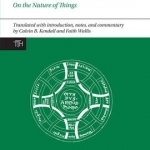Isidore of Seville, on the Nature of Things
BookThis item doesn’t have any media yet
2016 | History & Politics
For scholars in the European Middle Ages, Isidore, bishop of Seville (560? - 636) was one of the most influential authorities for understanding the natural world. Isidore's On the Nature of Things is the first work on natural science by a Christian author that is not a commentary on the creation story in Genesis. Instead, Isidore adopted a classical model to describe the structure of the physical cosmos, and discuss the principles of astronomy, physics, geography, meteorology and time-reckoning. Into this framework he incorporated an eclectic array of ancient and patristic erudition. The fact that On the Nature of Things presents an essentially Greco-Roman picture of the universe, but amplified with Christian reflections and allegories, played a crucial role in the assimilation of ancient science into the emerging culture of the Middle Ages. It exerted a deep and long-lasting influence on scholars like Bede, one of whose earliest works was an adaptation of On the Nature of Things. On the Nature of Things provides a new window into vital intellectual currents, as yet largely unexplored, flowing from Visigothic Spain into Celtic Ireland, Anglo-Saxon England, and Merovingian France.
This is the first translation of this work into English. The introduction places the work in the context of Isidore's milieu and concerns, and traces the remarkable diffusion of his book. A chapter-by-chapter commentary explains how Isidore selected and transformed his source material, and added his own distinctive features, notably the diagrams that gave this work its medieval name The Book of Wheels (Liber rotarum).
Related Items:
| Published by | Liverpool University Press |
| Edition | Unknown |
| ISBN | 9781781382943 |
| Language | N/A |
Images And Data Courtesy Of: Liverpool University Press.
This content (including text, images, videos and other media) is published and used in accordance
with Fair Use.
